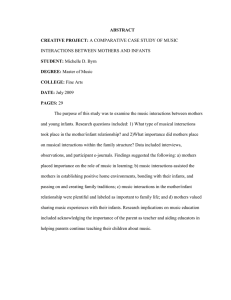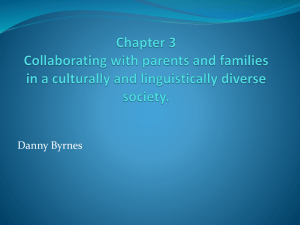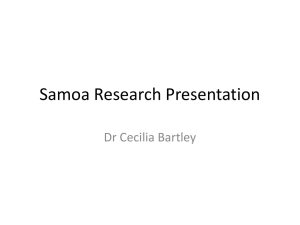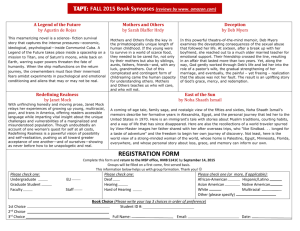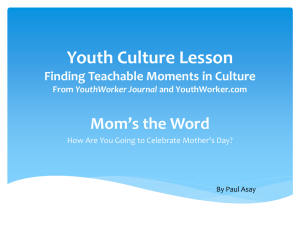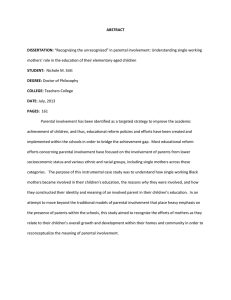The MOMS Partnership 2014 Data Report on Mothers in New...
advertisement
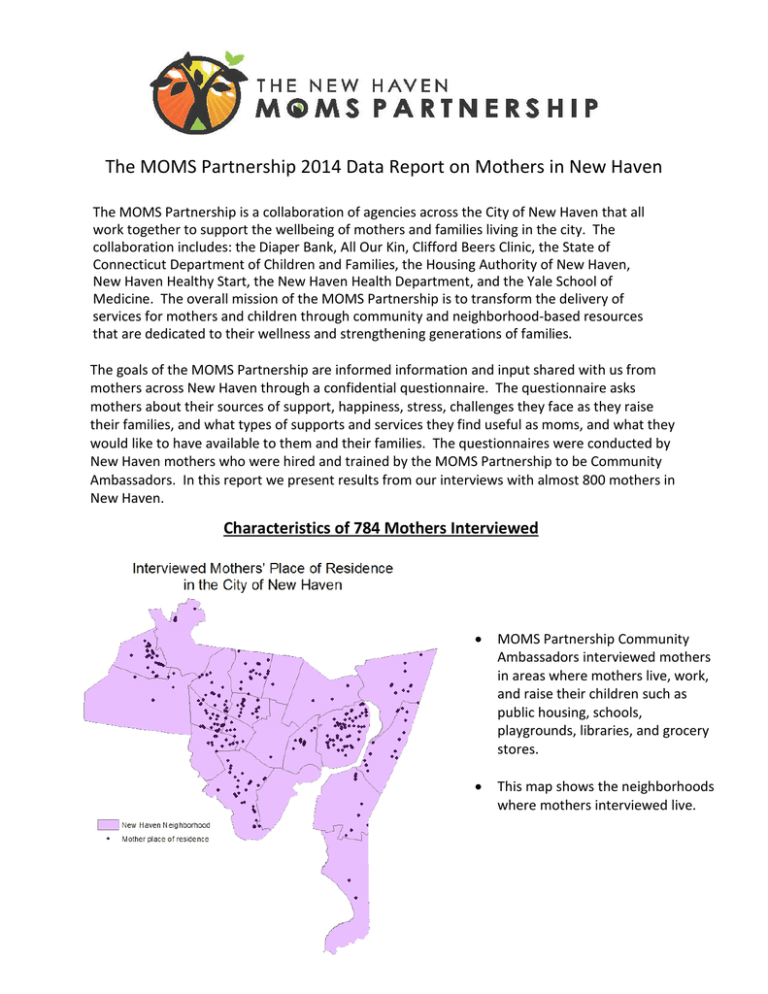
The MOMS Partnership 2014 Data Report on Mothers in New Haven The MOMS Partnership is a collaboration of agencies across the City of New Haven that all work together to support the wellbeing of mothers and families living in the city. The collaboration includes: the Diaper Bank, All Our Kin, Clifford Beers Clinic, the State of Connecticut Department of Children and Families, the Housing Authority of New Haven, New Haven Healthy Start, the New Haven Health Department, and the Yale School of Medicine. The overall mission of the MOMS Partnership is to transform the delivery of services for mothers and children through community and neighborhood-based resources that are dedicated to their wellness and strengthening generations of families. The goals of the MOMS Partnership are informed information and input shared with us from mothers across New Haven through a confidential questionnaire. The questionnaire asks mothers about their sources of support, happiness, stress, challenges they face as they raise their families, and what types of supports and services they find useful as moms, and what they would like to have available to them and their families. The questionnaires were conducted by New Haven mothers who were hired and trained by the MOMS Partnership to be Community Ambassadors. In this report we present results from our interviews with almost 800 mothers in New Haven. Characteristics of 784 Mothers Interviewed • MOMS Partnership Community Ambassadors interviewed mothers in areas where mothers live, work, and raise their children such as public housing, schools, playgrounds, libraries, and grocery stores. • This map shows the neighborhoods where mothers interviewed live. 2% Race/Ethnicity of Mothers Age of Nothers Less than 20 years 2% 20 – 44 years 68% 45 years and older 19% N/A 12% Number of Children under 18 Living with Mothers 1 child 23% 2 – 3 children 31% 4 or more children 6% N/A 40% 2% African American White 31% Hispanic 56% Other 9% N/A Mother has seen a healthcare provider in the past year Mother feels her children have a doctor who knows them well 27% 78% • The majority of mothers interviewed were African American or Hispanic. Approximately 15% of mothers spoke Spanish as their primary language. • Most mothers were between the ages of 20-44 years. The average age of mothers was 36 years. • Almost one-third of mothers had 2-3 children under the age of 18 living with them. • 27% of mothers had seen a healthcare provider in the past year, and 78% felt their children had a doctor who knew them well. Areas in which Mothers Need Support Areas in which Mothers Report Needing Help 71% 69% 68% 68% 68% 66% • Mothers reported needing support in the following areas: 1. Getting a good amount of exercise and eating healthily 2. Neighborhood safety and basic needs such as food, clothing, diapers, and housing 3. Skills to control stress • 66% of mothers reported needing help coping with traumatic events. • 62% of mothers reported needing help managing sadness. 62% 43% 43% 29% Basic Needs • Of mothers who responded to the question, 50% of mothers reported that their family sometimes runs out of food before the end of the month, what we call food need. • Of mothers who responded to the question, 40% reported that they sometimes feel they do not have enough diapers to change their children as often as they would like, what we call diaper need. • The number of mothers reporting difficulty meeting these basic needs varied by neighborhood in the City of New Haven. “[I wish there were] programs that help with bills, food, pampers…” • The percentage of mothers reporting running out of food before the end of the month was the highest in the Newhallville, West Rock, Wooster Square/ Mill River, and Hill neighborhoods. • Mothers living in the West Rock, Amity, Dixwell, and West River neighborhoods reported the most difficulty obtaining enough diapers to change their children as often as needed. Emotional Health Traumatic Childhood Experiences Mental Health Treatment 66% 28% 21% 19% 25% Need help coping Experienced 1 Experienced 2 or more traumatic traumatic with traumatic childhood childhood events experiences experience • Traumatic childhood experiences include sexual, physical, and emotional abuse, a family member who is an alcoholic, drug-user, or imprisoned, or a mother who is mentally ill or treated violently. • One in four mothers reported having experienced 2 or more traumatic childhood experiences. Has received mental Felt it was easy to get health treatment mental health treatment • While nearly one third of mothers reported having received treatment for stress, sadness, depression, or anxiety, not all of them felt it was easy to get the help they needed. • 77% of mothers reported needing help to manage feelings of sadness or depression, controlling stress, and coping with traumatic events, what we call emotional health need. • The number of mothers reporting emotional health need varied by neighborhood in the City of New Haven. • Of mothers responding to the emotional health questions, 100% in the Westville, Quinnipiac Meadows, Beaver Hills, Dwight, Dixwell, and West Rock neighborhoods reported needing help with their emotional health. What Stops Mothers From Getting Mental Health Treatment 24% 21% 20% 12% 10% 8% 3% 2% • When asked what stops mothers from getting the help they need for feelings of sadness, depression, stress, or anxiety, many mothers reported pride, embarrassment, and fear of being judged for getting mental health treatment. • Mothers also reported that there is a lack of mental health services available and many mothers are not sure where to go to get the help they need. “[Mothers don’t get help because of] fear, embarrassment, and not knowing where to look for help.” • Some mothers reported that mothers fear Department of Children and Families involvement or losing custody of their children if they seek mental health treatment. “[Mothers don’t get help] because they’re afraid if they say something their kids will be taken.” Social Isolation • 15% of mothers across New Haven reported social isolation. • Mothers reported feeling alone in raising their children and that they do not have significant sources of support in their lives. “Lots of challenges [as a mom] because I am doing it on my own most of the time.” Crime in New Haven • Mothers reported concerns over raising their families in violent neighborhoods. “[A challenge as a mom is the] crime in the neighborhood and making sure my children are safe.” • This map shows the level of violet, nonviolent, and domestic crime by neighborhood in the City of New Haven. Some neighborhoods experience higher levels of crime than others. • This map shows the level of domestic crime only by neighborhood in the City of New Haven. • The Hill, Fair Haven, and Newhallville neighborhoods have the highest level of domestic crime per year. • A high percentage of mothers in the Fair Haven neighborhood reported needing help with their emotional health. • The Newhallville and Fair Haven neighborhoods were also neighborhoods where a high percentage of mothers reported social isolation. The New Haven Mental health Outreach for MotherS (MOMS) Partnership 142 Temple Street, Suite #301 New Haven, CT 06510 (203)-764-8125 kia.levey@yale.edu
